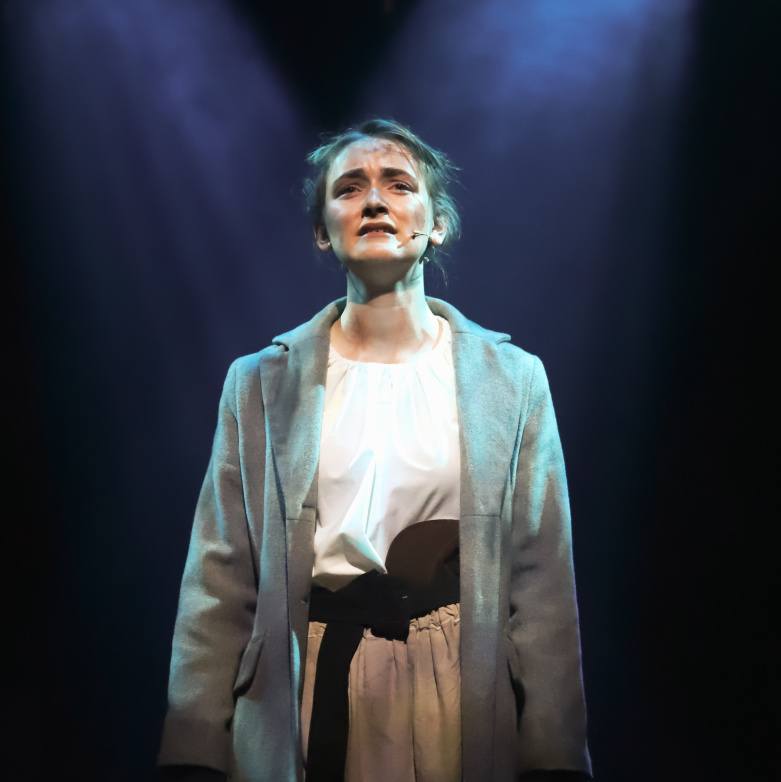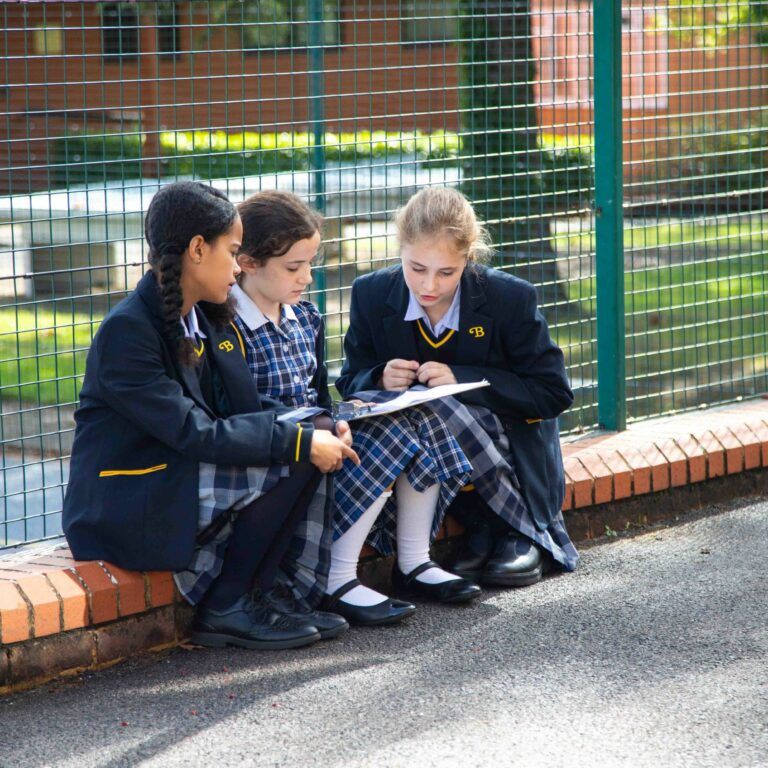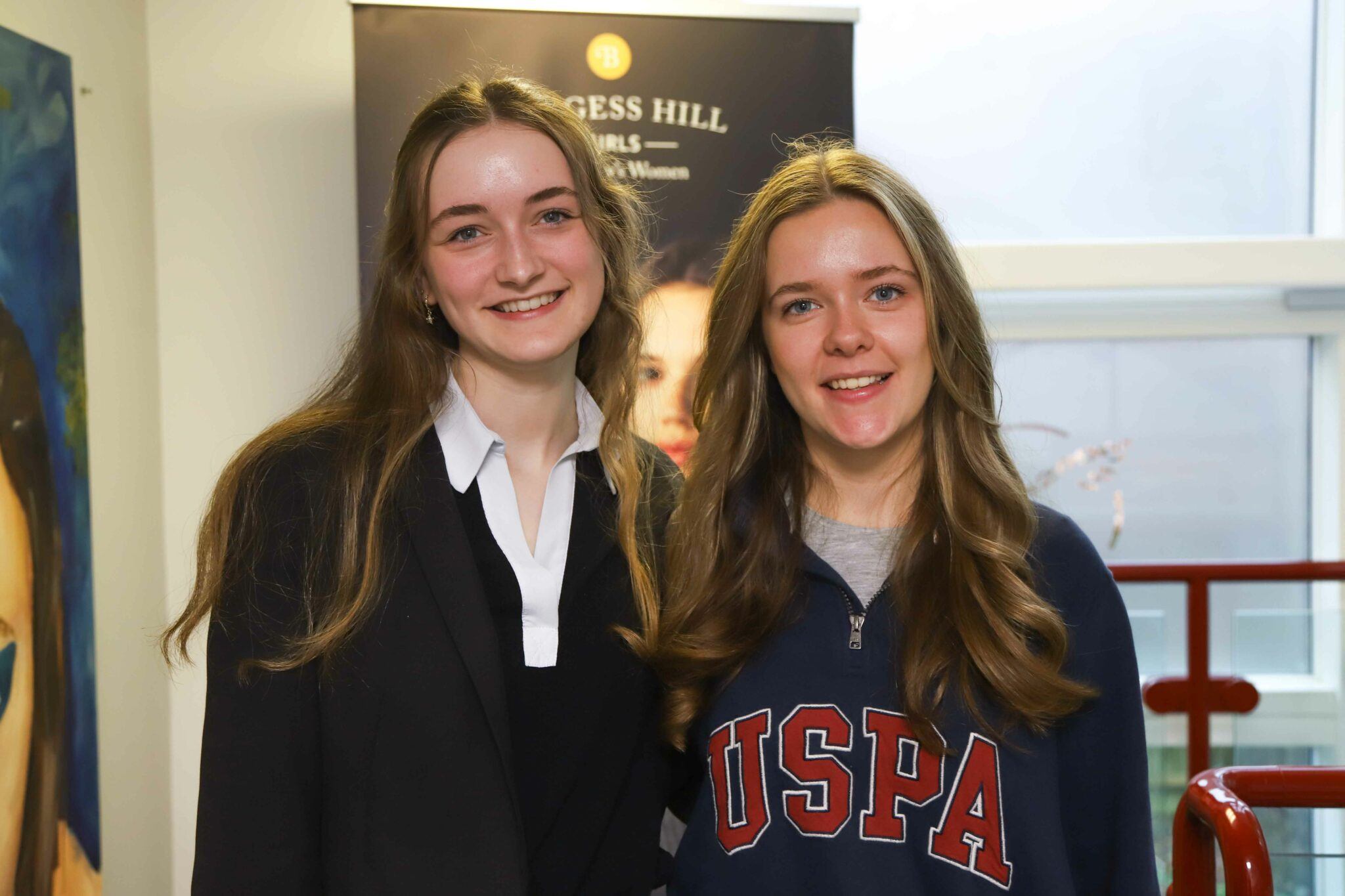We are delighted for Caitlinn and Poppy, who have recently received offers to study Musical Theatre and Acting at leading European Conservatoires Trinity Laban and Leeds. We caught up with them to find out more about their friendship, their love of drama, sharing the role of Eponine in the recent production of Les Mis, and finally, all the hard work involved in securing these amazing offers!
How long have you been at Burgess Hill Girls?
Caitlinn: I joined Burgess Hill Girls in Year Seven as a drama and academic scholar.
Poppy: I joined the Sixth Form almost two years ago. Since then I have really tried to get everything I can out of my experience here.
How did you get into drama?
C: It sounds cliched, but I have always loved the excitement that comes with being in front of an audience! Even in nursery ‘concerts’ I found it so exciting to have a line or a solo, and took part in theatre both in and outside of school since primary school. I started dance lessons when I was around four or five years old, which contributed to my love for music and performance. I think the moment I realised I wanted to look into drama for the future was when I was given the lead part in the KS2 Nativity at my primary school. I adored singing and acting in front of an audience, and since then I have joined a drama academy to train in musical theatre called Ariel Company Theatre, which I have attended for just over nine years now.
P: I can’t remember a time when I wasn’t performing even if it was to my parents, I loved ‘being’ someone else, putting on silly accents and dressing in lots of funny costumes. But I suppose when it really began was when I got a scholarship into year 7 as that’s when I began to take it more seriously, seeing it as a ‘subject’ rather than a hobby and something I could get really good at. I then took every opportunity I could to be on stage taking part in school plays, musicals and even a play written by an older student. I find it so rewarding as each performance is entirely different, you take on an entirely new personality and backstory.
Can you tell us about your friendship
C: Poppy and I met when she joined in Lower Sixth, and we very quickly became close friends probably from having so many classes together! Poppy is such an incredible performer, when she acts it feels so genuine and not like she is “pretending” to be the character. She has an exceptional range; in the span of three months I watched her go from playing the teenage boy bully Mark in ‘DNA’, to the puppet Pinocchio in ‘Shrek the Musical’. Going through this process with Poppy has been amazing, she is so supportive and we always call and message each other after each audition to see how it went!
P: We met when I began at Sixth Form at Burgess Hill Girls. We then became instant friends as we had similar interests and passions. We both loved to invest as much time as possible in anything drama related, going on all the school trips (such as the Broadway experience trip in New York!) and running drama clubs for younger students. Caitlinn has shown throughout her time at Burgess Hill Girls her passion and excellence for performance. She is incredibly talented and her voice transfixes every audience whether she be performing as Eponine in Les Mis or in choir performances and showcases. During her portrayal of Eponine you could really feel everything she felt through her voice, it was so strong and emotive and I can’t wait to see where she goes!

What have been your drama highlights at Burgess Hill Girls?
C: I’ll always remember my first production at Burgess Hill Girls, ‘Tales From Europe’ directed by Phao Wheatley, a Bold Girl. Being onstage almost immediately after joining in Year 7 was such a testament to me that I had come to the right place where performing opportunities were surplus. Another highlight for me was the production of ‘Made In Dagenham’ in 2022, where I played Rita. It was my first leading lady in a full-scale musical, and I will forever be grateful for the resilience and confidence that it gave me. The recent production of ‘Les Mis’ was so special for me; it had been one of my favourite musicals since I was 10 years old, and getting to perform as Eponine in the show that confirmed to me that I wanted to come to Burgess Hill Girls was an incredible full-circle moment.
P: My highlights of Burgess Hill Girls have got to be DNA and Les Mis, Mrs Cassim is an incredible director and was able to make both experiences so enjoyable. She really brought the shows to life whether it be through her amazing set designs or her direction. I loved being able to play two completely contrasting roles. Mark in DNA was a challenge as it was so far removed from myself (I was playing an aggressive guy) and I loved really trying to get into the inner psyche of the character. Whereas, with Eponine, I found that it was the opposite although there was anger there was more heartbreak. I really had two very different characters, aggression versus heartbreak. I’m so grateful I had the opportunity to experience these roles.

What is drama like at Burgess Hill Girls?
C: Drama is particularly special at Burgess Hill Girls because they care so much about it. The school productions are so impressive because the whole team puts a lot of effort into them, with direction, performance, and design. I have been given opportunities not only to perform onstage, but to be a part of the technical side to theatre; I’ve been a part of the backstage crew, the sound operator, and the lighting operator for various events and productions. I am interested in all aspects of theatre, so this has been amazing for developing my understanding of technical theatre and the parts that the audience doesn’t see. Having been in small drama classes since joining in Year 7, the teachers know me and my abilities very well, so I have been able to improve in my own performance because of the personal approach Burgess Hill Girls provides. The teachers truly care and are knowledgeable about the performing arts, so I feel I can talk about my interests too.
P: I think what makes drama at Burgess Hill Girls so special is the collaboration between year groups. For example if you are in a school show you are working closely with other years and then there are also drama clubs run for Year 7 and 8 led by a Sixth Form team. I think this is so vital to drama, to feel like you are part of a team and the department really does feel like one!
Why do you want to study drama at university?
C: For me, doing some kind of performance degree has felt like a given since Senior School. I can’t picture myself being happy doing anything else, and have been assured in studying musical theatre since around Year 9. I know that I want a career in the performing arts industry, and so getting a degree in musical theatre will hopefully be a path into that career.
P: Throughout GCSE I knew that drama and performing arts were my favourite subjects but didn’t quite know whether I wanted to commit so early. It was only after joining Burgess Hill Girls when I realised that I really couldn’t see myself in any other field of study. My Dad talked through other options but I just knew they weren’t for me. That’s when I began looking at acting courses, looking at lots of different degrees some taking a more academic or directing focus than others. I knew all I really wanted was to be in all day every day doing the thing I loved most so knew Leeds was the course for me due to their high contact hours.
What did you have to do as part of your applications?
C: Since musical theatre is a ‘triple-threat’ course, for each audition I have had to complete a singing round, an acting round, and a dance round. The dance round would include technical exercises, and a routine that would be performed to the panel. In singing, we would prepare two contrasting musical theatre songs (one contemporary, and one pre-1965) that would be performed with an accompanist – similarly, for the acting round we would bring either one or two monologues to perform. For some courses I have had to film myself doing this before being invited to a recall in-person.
P: As part of my applications, I was required to first write a personal statement explaining my experiences and my passion for the subject and then I was required to send off self-tapes for all of the drama schools. Self-tapes require you to film two contrasting monologues: a Shakespeare and a modern monologue. After my self-tapes I then waited in hope of receiving an offer for a recall. At my recall I had a workshop with other applicants, an interview and then was required to again show my two monologues and then be redirected for one of them. This was a tough process but Burgess Hill Girls really guided and supported me, a big thank you must go to Mr Osborne who recorded my self-tapes and had to sit through many retakes.
Conservatories are notoriously hard to get into. How did you manage it?
C: For all of my auditions, I had been preparing material for about six months (if not, longer) prior. A lot of the courses will ask for similar things, such as two contrasting songs that meet their requirements. I spent a lot of my singing lessons trying out different songs and cutting down the sheet music to fit the time frame provided by the school. I think being prepared and not leaving things like this to the last minute really helped, since I knew the songs and the cuts really well and wasn’t singing them for the first time in the audition.
P: I had previously done some auditions for different summer courses and so knew the layout for the auditions, I think this helped me to know what to expect and what they were looking for – especially in the workshops which I would never have really experienced before this. I struggled picking monologues for my auditions as I feel like I am relatively picky, I spent lots of time looking through monologue books, monologue sites and asked for help from Mrs Cassim (Director of Drama). Eventually I found a monologue that really resonated with me. Overall, the main thing that really helped me to get into the character was understanding the character in the context of the play so that I could understand what they had been through and also their way of thinking, I think this is most important for portraying an authentic representation of a character.
What do you hope to do in the future?
C: I’m hoping that post-graduation I can begin auditioning and working in the performing arts industry. Whilst musical theatre focuses on a career onstage, I am also very interested in working in the TV and film industry because I enjoy looking at the differences between acting for a live audience and acting for a camera.
P: I hope in the future to continue to work in the performing arts, honing my craft. My goal is to be on the stage or screen doing what I love and exploring all elements of the industry whether it be voice-over work or presenting.




